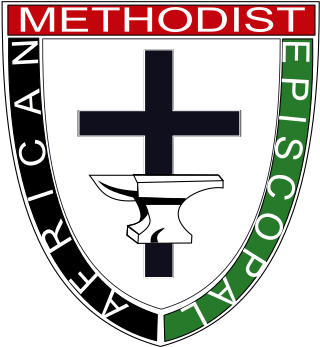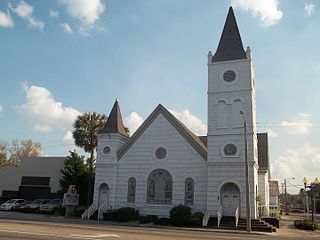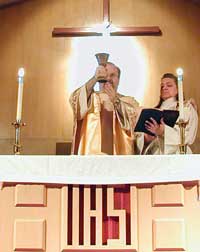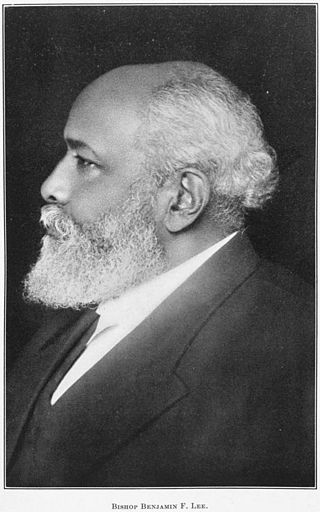Related Research Articles

The African Methodist Episcopal Church, usually called the AME Church or AME, is a Methodist denomination based in the United States. It adheres to Wesleyan–Arminian theology and has a connexional polity. It cooperates with other Methodist bodies through the World Methodist Council and Wesleyan Holiness Connection.

The Christian Methodist Episcopal Church (C.M.E.C.) is a Methodist denomination that is based in the United States. It adheres to Wesleyan-Arminian theology. Though historically a part of the black church, the Christian Methodist Episcopal today has a church membership of people from all racial backgrounds.

The African Methodist Episcopal Zion Church, or the AME Zion Church (AMEZ) is a historically African-American Christian denomination based in the United States. It was officially formed in 1821 in New York City, but operated for a number of years before then. The African Methodist Episcopal Zion Church adheres to Wesleyan-Arminian theology.

The cell group is a form of church organization that is used in many Christian churches. Cell groups are generally intended to teach the Bible and personalize Christian fellowship. They are always used in cell churches, but also occur in parachurch organizations and other interdenominational settings, where they are usually referred to as Bible study groups. In Methodism, they are known as class meetings and are a means of grace; in Catholicism, they are known as basic ecclesial communities.

Black churches primarily arose in the 19th century, during a time when race-based slavery and racial segregation were both commonly practiced in the United States. Blacks generally searched for an area where they could independently express their faith, find leadership, and escape from inferior treatment in White dominated churches. The Black Church is the faith and body of Christian denominations and congregations in the United States that predominantly minister to, and are also led by African Americans, as well as these churches' collective traditions and members.

Garrett–Evangelical Theological Seminary (Garrett) is a private seminary and graduate school of theology related to the United Methodist Church and is ecumenical in spirit. It is located in Evanston, Illinois, on the campus of Northwestern University. The seminary offers master's- and doctoral-level degrees, as well as certificate, micro-credentialing, and lifelong learning programs. It has thousands of alumni serving in ministry, education, organizational leadership, and public service throughout the world.
Boston University School of Theology (STH) is the oldest theological seminary of American Methodism and the founding school of Boston University, the largest private research university in New England. It is one of thirteen theological schools maintained by the United Methodist Church. BUSTH is a member of the Boston Theological Institute consortium.

Daniel Alexander Payne was an American bishop, educator, college administrator and author. A major shaper of the African Methodist Episcopal Church (AME), Payne stressed education and preparation of ministers and introduced more order in the church, becoming its sixth bishop and serving for more than four decades (1852–1893) as well as becoming one of the founders of Wilberforce University in Ohio in 1856. In 1863, the AME Church bought the college and chose Payne to lead it; he became the first African-American president of a college in the United States and served in that position until 1877.

An elder, in many Methodist churches, is an ordained minister that has the responsibilities to preach and teach, preside at the celebration of the sacraments, administer the church through pastoral guidance, and lead the congregations under their care in service ministry to the world.
Bryan P. Stone is an American theologian who is the Associate Dean of Academic Affairs and the E. Stanley Jones Professor of Evangelism at Boston University School of Theology, and a Co-director of the Center for Practical Theology. Stone writes on topics related to both systematic theology and practical theology. He is associated with both postliberalism and Christian pacifism, having been influenced by thinkers such as John Howard Yoder, Stanley Hauerwas, Alasdair MacIntyre, and John Wesley, and in his earliest work with liberation theology and process theology.

Religion of Black Americans refers to the religious and spiritual practices of African Americans. Historians generally agree that the religious life of Black Americans "forms the foundation of their community life". Before 1775 there was scattered evidence of organized religion among Black people in the Thirteen Colonies. The Methodist and Baptist churches became much more active in the 1780s. Their growth was quite rapid for the next 150 years, until their membership included the majority of Black Americans.

Jeremiah Eames Rankin was an abolitionist, champion of the temperance movement, minister of Washington D.C.'s First Congregational Church, and correspondent with Frederick Douglass. In 1890 he was appointed sixth president of Howard University in Washington, D.C. Howard's Andrew Rankin Memorial Chapel was built during Jeremiah Rankin's tenure as president (1890–1903) and named after his brother. Rankin is best known as author of the hymns "God Be with You 'Til we Meet Again" and "Tell It to Jesus". In 1903 Rankin published a fictional journal of Esther Burr.
Black Methodism in the United States is the Methodist tradition within the Black Church, largely consisting of congregations in the African Methodist Episcopal (AME), African Methodist Episcopal Zion, Christian Methodist Episcopal denominations, as well as those African American congregations in other Methodist denominations, such as the Free Methodist Church.

Hood Theological Seminary is a Christian seminary sponsored by the African Methodist Episcopal Zion Church in Salisbury, North Carolina. It is a graduate and professional school sponsored by the African Methodist Episcopal Zion Church and approved by the University Senate of The United Methodist Church. From its founding in 1879 until 2001, the seminary was part of Livingstone College; it is now independent. The seminary is accredited by the Association of Theological Schools in the United States and Canada.

The history of Methodism in the United States dates back to the mid-18th century with the ministries of early Methodist preachers such as Laurence Coughlan and Robert Strawbridge. Following the American Revolution most of the Anglican clergy who had been in America came back to England. John Wesley, the founder of Methodism, sent Thomas Coke to America where he and Francis Asbury founded the Methodist Episcopal Church, which was to later establish itself as the largest denomination in America during the 19th century.
Christopher Michael Jones is an American former hip hop and R&B record producer He is also the author of the first published resource written for African-American high school graduates and Christian college students entitled What to Expect When You're Accepted: An African American Christian's Guide to College.
Kimberly Bracken Long is currently the editor of Call to Worship: Liturgy, Music, Preaching, and the Arts, the liturgy journal for the Presbyterian Church (U.S.A.). She is also the pastor of two small United Methodist churches: Antioch United Methodist Church and Spedden United Methodist Church. She was ordained as a minister of the Presbyterian Church (U.S.A.) and a professor of sacramental and liturgical worship in the tradition of the reformed church at Columbia Theological Seminary. Her work has been influential in turning greater attention towards the meaning and place of sacraments and liturgical language in worship. Her most recent work focuses on the theology and history of marriage, with a particular emphasis on inclusive marriage liturgy. She is married to professor of preaching Thomas G. Long.

Benjamin Franklin Lee was a religious leader and educator in the United States. He was the president of Wilberforce University from 1876 to 1884. He was editor of the Christian Recorder from 1884 to 1892. He was then elected a bishop in the African Methodist Episcopal (AME) church, serving from 1892 until his resignation in 1921, becoming senior bishop in the church in 1915.

Payne Theological Seminary is an African Methodist Episcopal seminary in Wilberforce, Ohio. It is the oldest free-standing African-American seminary in the United States. Incorporated in 1894 by the African Methodist Episcopal Church, it was named after Daniel Alexander Payne, the founder of Wilberforce University. Payne was Senior Bishop of the AME Church at the time of the Seminary’s founding and served as its first dean. He was the first African-American college president.
Hilliard Kwashie Dela Dogbe is a Ghanaian clergyman and bishop in the African Methodist Episcopal Zion Church. He currently serves as the Bishop of the Western West Africa Episcopal District, which encompasses Liberia, Côte d'Ivoire, Ghana and Togo.
References
- ↑ Tribble, Jeffery. "Jeffery Tribble" (PDF). Columbia Theological Seminary Faculty. Columbia Theological Seminary. Archived from the original (PDF) on 2016-10-11. Retrieved 2017-08-10.
- ↑ "Tribble for Transformation". Tribble for Transformation.[ permanent dead link ]
- ↑ "Transformative Pastoral Leadership in the Black Church". Palgrave Macmillan. Macmillan Publishers.
- ↑ "Festival of Faith: Jeffery Tribble". Festival of Faith Presenters. Festival of Faith. Archived from the original on 2015-12-08. Retrieved 2015-11-30.
- ↑ Dudley, Carl; Jarrett, Nathaniel. "Transformative Pastoral Leadership in the Black Church Review". Palgrave Macmillen. Macmillen Publishers.
- ↑ Graham, Elaine; Schröder, Bernd (May 2013). "Reviews". International Journal of Practical Theology. 16 (2): 409–421. doi:10.1515/ijpt-2012-0022.
- ↑ Lockhart-Gilroy, Annie (2012). "A Review of "Greenhouses of Hope: Congregations Growing Young Leaders Who Will Change the World"". Religious Education. 107 (4): 433–434. doi:10.1080/00344087.2012.699419. S2CID 142536829.
- ↑ Creasy Dean, Kenda. "Growing Youth". Christian Century. Christian Century.